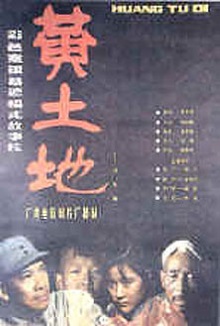
Despite having already watched this multiple times while studying in China my wife asked to watch it again after having gained more experience of cinema from all around the world. I suppose that as one of the most important films of China it’s about time that I watched it as well. It was the directorial debut of Chen Kaige and it was photographed by Zhang Yimou, arguably the two doyens of Chinese cinema.
The story takes place in 1939 when the Kuomintang and the Communists are supposed to have allied against the Japanese. Gu Qing, a soldier from the Eight Route Army, travels from the Communist base of Yan’an to the Kuomingtang controlled rural areas of Shaanxi province. His task is to collect and document the folk songs of the local peasants so that they can be used to inspire the soldiers of the Communist forces. Arriving at a tiny village, he sees for himself the hardships faced by the farmers. He befriends the members of the family he lodges with and in particular sympathizes with the plight of a young girl named Cuijiao. Only 14-years old, she faces the miserable prospect of being married off to a much older man and eloquently expresses her bitterness through her singing. When Gu Qing tells her about how the Communists are fighting to create a better future for all of China, Cuijiao dreams of running away to join the cause.
The film has minimal dialogue, using instead its visuals and the lyrics of the songs to convey its meaning. The earth looms large in every landscape scene and the peasants appear like tiny ants who are powerless in the face of a pitiless universe. The stark deprivation under which they live is shown in many understated but effective ways: Gu Qing arrives in the village just in time to attend a local wedding. When they bring out the food, one of the dishes is fish but it turns out to only be a wooden carving of a fish drenched in sauce. Against this sense of being trapped in a cycle of poverty and misery from which there is no hope of escape, the farmers can only express their bitterness in the form of their lamentations. Cuijiao’s father even mocks Gu Qing for being interested in their songs that are full only of pain. The sentiment expressed in this film is blunt but undeniably powerful.
At the same time, Yellow Earth retains an element of Communist propaganda. Gu Qing implies that their miserable existence is due to some measure to the rich and promises that life will be better under the Communists. My wife claims that this is a deliberate subversion as everyone can see for themselves that the plight of the peasants are purely local and that they seem so disconnected from the wider China that blaming anyone except the heavens for their fate feels silly. Cuijiao’s father even expresses some of this skepticism. Peasants in this area have always lived in this manner, following their own rules and rites, how could things ever be otherwise? In any case while the praise for Mao Zedong feels distasteful and dishonest given what we know happens to the peasants afterwards, Chen must be applauded for threading a tricky path between offending the state censors and being blindly subservient to the official line.
For more modern sensibilities, I think this film is a powerful statement of how miserable the existence of subsistence farmers can be. Critics of capitalism have a tendency to romanticize rural farmers and often have effusive praise for their simple and so they argue more authentic lifestyle. While it was probably not Chen’s intention at the time, Yellow Earth lays bare the naivety of that argument and indirectly demonstrates how important and how valuable China’s modern economic development has been. In any care, I consider this to a cinematic masterpiece and especially one that should be easily accessible to everyone.
2 thoughts on “Yellow Earth (1984)”